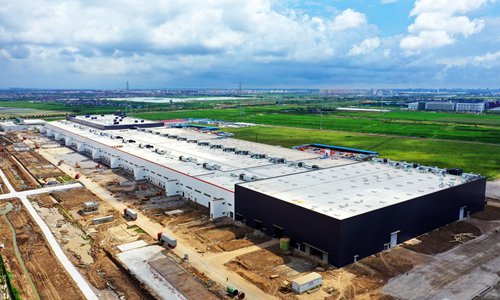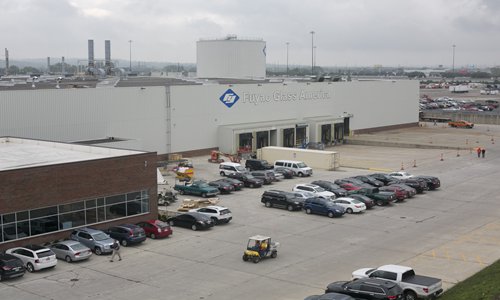HOME >> BUSINESS
Tesla’s green light in China versus Chinese firms’ struggle in US
By Zhang Hongpei Source:Global Times Published: 2019/9/10 18:13:41
Opportunities and challenges remain ahead

An aerial view of Tesla's factory in Shanghai in August Photo: IC

Fuyao Glass facilities in Ohio in September 2016 File photo: VCG
Following an onstage dialogue with Alibaba's Jack Ma Yun during the annual World Artificial Intelligence Congress (WAIC) held in Shanghai at the end of August, Elon Musk, CEO of US electric vehicle (EV) producer Tesla, repeated his routine in China: eating Chinese food and meeting with high-level Chinese officials to pave the way for further development in the country.
"It seems every time Musk comes to China, he will nail down something substantial for his brand," an auto industry observer, who asked to remain anonymous, told the Global Times.
On August 30, the same day Musk met with Transport Minister Li Xiaopeng and Vice Minister of Industry and Information Technology Xin Guobin, Tesla announced it was exempt from purchase tax, which could run high up to 90,000 yuan ($13,791) for a Tesla vehicle.
Chinese consumers who buy home-made EVs do not have to pay the purchase tax from the very beginning.
From breaking ground in December last year, it took only eight months for the company to build its Gigafactory in Shanghai, breaking the record for the speed of construction for a normal factory, which usually takes 18 to 24 months.
During the WAIC, Musk expressed his praise for the construction efficiency at the Shanghai factory. Tesla China's team had done an excellent job building the factory and he was "astounded." Musk said he had never before seen anything move so fast in his life. "I really think China is the future," he said.
The unprecedented construction speed is "very Musk," as he is an entrepreneur pursuing high efficiency and result-oriented projects. "China's speed, efficiency and Musk's leadership style match very well," the industry observer said.
On August 19, Tesla received its first comprehensive acceptance certificate, within three days of making the application, which also broke the record for the shortest time local government had taken to issue a certificate.
Green light all the way
It seems like Tesla has been green-lighted continuously, since making its foray into the Chinese market several years ago, in terms of gaining government support.
Tesla is the first solely-owned foreign car company in China, where joint ventures take up the majority of the auto sector.
Tesla has chosen to branch out into China at a time that China is determined to open up its auto market in a comprehensive way, and at a time the country endeavors to push ahead its new-energy vehicle sector to take a leading position in the world, said Mei Songlin, a senior analyst in the auto industry.
China lifted the stake cap in joint ventures in the auto sector last year, allowing foreign firms to take major shareholdings.
For Tesla or Musk, it is an opportunity that is not to be missed, Mei told the Global Times on Monday.
"China welcomes such a global EV leader to invest in the market, bringing tax revenue and employment, as well as its cutting-edge technology which has been accumulated in the US for years," Yale Zhang, head of Shanghai-based consultancy Automotive Foresight, told the Global Times in an interview on Monday.
Tesla is confident that it will meet the tax revenue target it set for its Shanghai factory, which will be put into operation at the end of this year to produce its Model 3 vehicles.
The US car giant disclosed in a July filing that, "We believe the tax revenue target and capital expenditure requirement will be attainable even if our actual vehicle production was far lower than the volumes we are forecasting."
Tesla agreed to pay 2.23 billion yuan in taxes each year from the end of 2023.
China is Tesla's second-largest market after the US, yet it is expected to surpass the latter within five years, said Zhang.
Some observers have held a suspicious view of whether or not the US firm would continue its high-profile moves in the Chinese market after local production is on track.
According to Mei, the Chinese market holds high expectations for Tesla as its cars are imported, luxury products that can represent the most advanced EV technologies in the world including autonomous driving technology. "But will it maintain its brand image after localization? Will its quality remain at the same level after costs are cut in the Shanghai factory? Tesla needs to weather the market test in coming years," said Mei.
But one thing is certain - when doing business in China, foreign firms will not find the work ethic conflict that Chinese auto-glass maker Fuyao has encountered in the US market, he added.
Going abroad is not easy
Fuyao Glass, China's largest auto-glass maker, has ignited wide discussion over its work ethic as reflected in the documentary American Factory.
Fuyao's boss Cao Dewang provided more than 2,000 jobs in the US' rust-belt state of Ohio in 2014, by investing in a factory there which had previously been shut down by US carmaker General Motors.
The Chinese boss brought the factory back to life and helped solve local unemployment.
After successfully blocking the entry of the United Automobile Workers (UAW) organization into the US factory, it became profitable in 2017.
Despite a cultural gap and work-concept conflict between China and the US, China's manufacturing competence backed by diligent, efficient workers and strict management over past decades is reflected in the documentary.
Fuyao Glass, as a supplier for vehicles, was welcomed to invest in the US back in 2014 by local government, but the obstacles that it later encountered were difficult to avoid in the US, said Zhang.
However, in the auto-making sector, it has always been challenging to set foot in developed economies such as the US and Europe.
Shenzhen-based automaker BYD held a ceremony in April this year to mark the completion of the 300th electric bus at its Lancaster manufacturing plant in the US state of California.
Since the delivery of its first US battery electric bus in 2014, BYD has provided buses for customers in 13 US states and four Canadian provinces, according to Xinhua News Agency.
However, in the passenger vehicle sector, it is still hard for Chinese firms to win shares in America. "Developed countries are holding the auto-making industry firmly in their own hands since it is a pillar industry for an economy," said Zhang.
Automakers like Guangzhou Automobile Group Co, Great Wall Motor and SAIC have all disclosed their intentions to enter the US market, but little action has been taken given the complex environment, such organization forces as the UAW, and the US' strict laws and rules.
The ongoing China-US trade war has also cast a shadow on such attempts by domestic players.
"The current situation has dented investment opportunities in the country. Even though a Chinese firm's investment can bring many benefits for local economy, it does not want to take the risk at the moment amid the trade war," said Mei.
Mei added that Chinese automakers' branding capabilities are generally weak compared with foreign counterparts, and that they need to catch up quickly.
"For the US or European markets, the lane of internal combustion cars is already quite crowded. It is hard to struggle for space, yet for the electric vehicle segment, opportunities are out there," Mei noted.